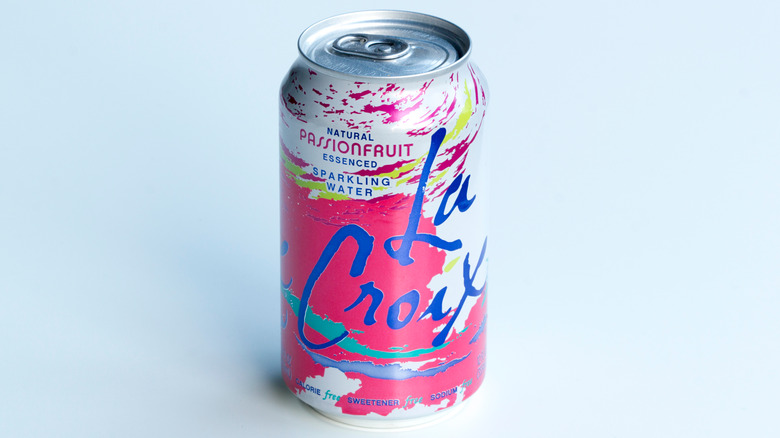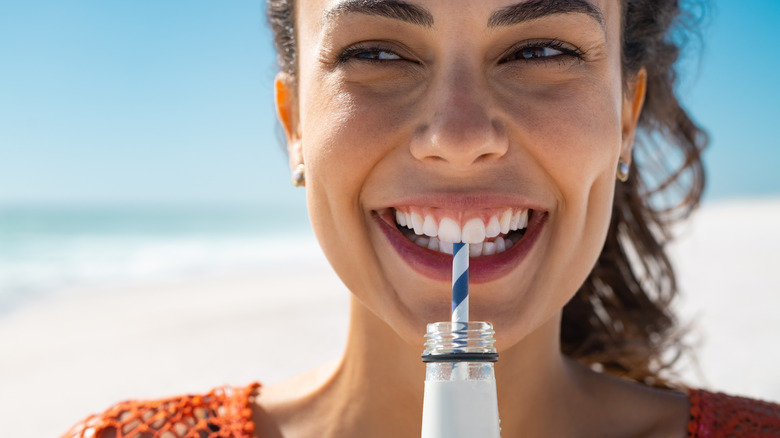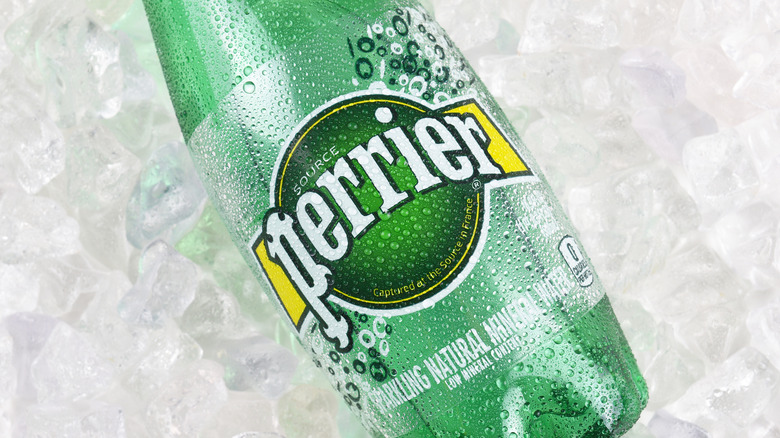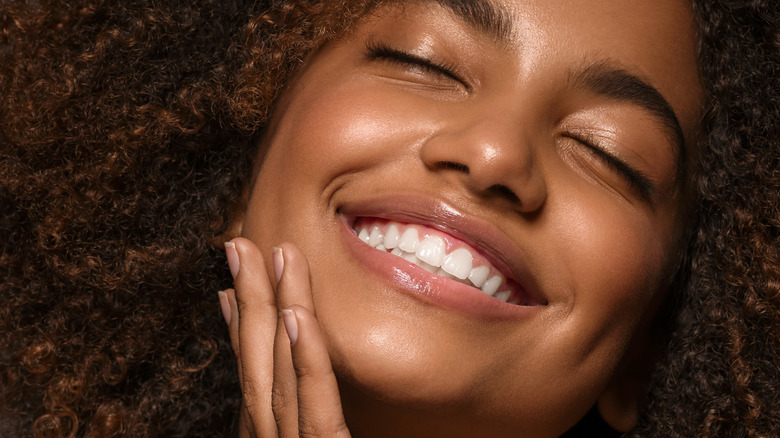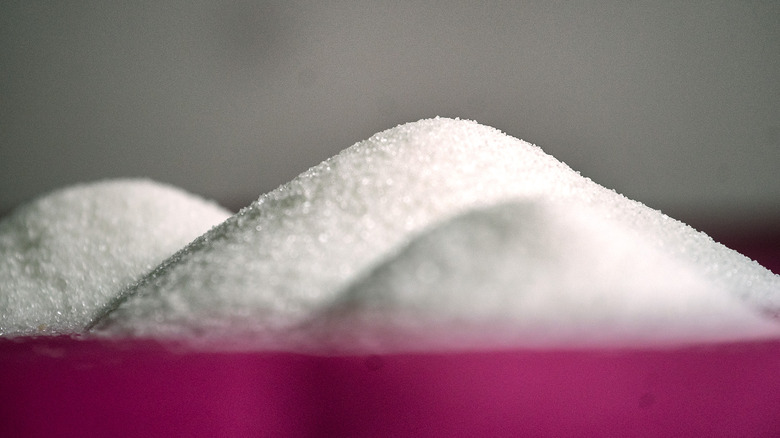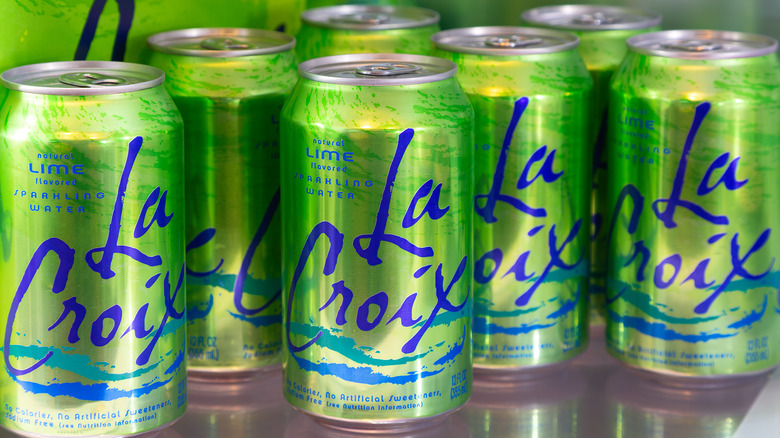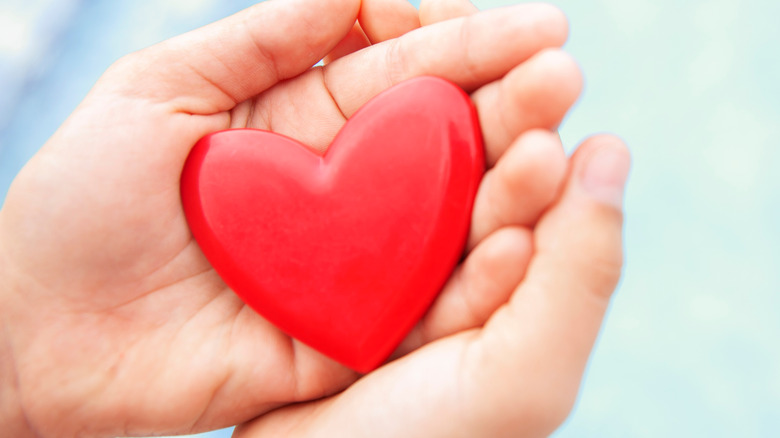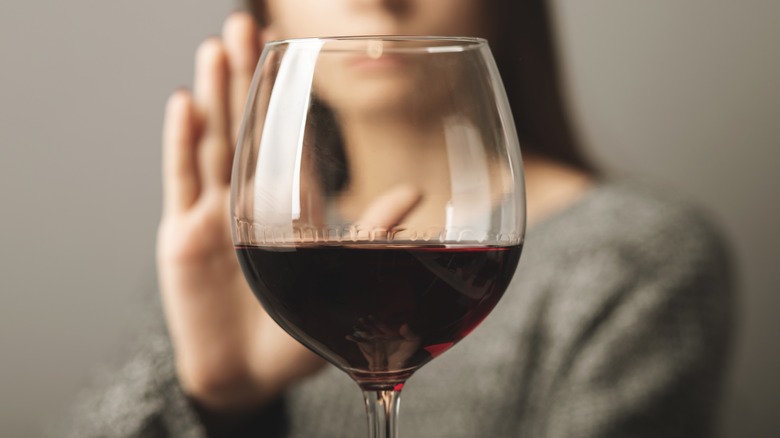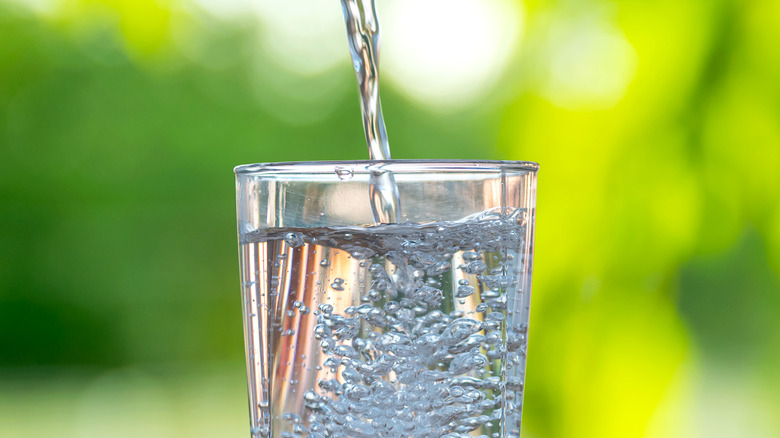What Happens To Your Body When You Drink Sparkling Water Daily
There was once a person out there — a maverick, if you will — who took a look at regular, plain old water, and thought "I can make this even better." Okay, it may not have happened quite like that, but when British scientist Joseph Priestly figured out how to add carbonation to water back in the 18th century (per borg&overström), he kicked off an industry that took the world by storm.
Today, sparkling water is a monolith: The simple fizzy drink racked in almost $6 billion in sales in 2019 (per Statista), and the global sparkling water market is projected to increase in size by a whopping 12.6% every year until 2028, according to Grand View Research. That's a lot of bubbles.
But as sales of sparkling water increase, so do questions about its effects on the body. On the surface, it seems pretty simple: Just water with bubbles, so what impact could it possibly have, right? Well, drinking sparkling water every day, it might surprise you to hear, actually can have a pretty big effect on your system — and it may not be what you expect. Let's crack the can open and find out what happens if you drink sparkling water daily.
Drinking sparkling water every day will help you stay hydrated
Look, we're just going to point out the obvious here. That sparkling water you're drinking? It's doing a great job at keeping you hydrated. In fact, there's no difference between plain sparkling water and still water on the hydration front: Both will hydrate you as well as the other, helping to reduce the risk of becoming dehydrated (per WebMD). It's important to remember, though, that while regular sparkling water is nothing but water mixed with carbon dioxide gas, there are some varieties out there that may contain additives, flavorings, or even caffeine, which may have a different impact on your hydration levels.
And just in case you need a crash course on why staying hydrated is important: Keeping your water intake regular has an impact on basically every aspect of your body, from cell function to maintaining immunity to ensuring that your joints are working correctly (per Harvard T.H. Chan School of Public Health). If you experience regular dehydration, it can start to affect your system pretty profoundly, and even lead to problems with your organs.
If you drink sparkling water every day, your bones won't be affected
One of the most common question marks around sparkling water is its effects on your bones. The story goes that certain ingredients present in sparkling water, specifically phosphoric acid, may cause your bones to lose calcium and weaken over time (per Harvard Health Publishing).
Luckily, though, sparkling water and many other carbonated drinks appear to be safe to consume for your bones, according to research published in The American Journal of Clinical Nutrition. The study looked at the difference in impact on bone density when comparing different carbonated drinks, and found that for carbonated drinks that weren't colas (like seltzer water), there appeared to be no significant impact on the bones after drinking them regularly. Drinking colas, on the other hand, appeared to instigate decreased bone density in the study's participants.
There are a few reasons why this could be the case: One hypothesis might be down to the caffeine in cola impacting calcium absorption, as Harvard Health Publishing discusses. Another may be that drinking cola replaced other bone-friendly drinks (like milk). Either way, when it comes to drinking sparkling water, your skeleton will be thanking you for it.
If you experience heartburn, you might want to skip sparkling water every day
As sparkling water is essentially water with lots of bubbles, it's reasonable to assume that it's probably not going to have too much of an impact on you. But those bubbles can create issues in themselves, particularly for your digestive system. More specifically, sparkling water, along with other carbonated beverages, may cause heartburn, according to the Mayo Clinic. Sparkling water may trigger acid reflux, with your stomach acid working its way back up into your chest from your stomach, causing that telltale burning sensation.
An associated condition, GERD (gastroesophageal reflux disease), may also be triggered by sparkling water, says UChicagoMedicine. GERD is distinguished from regular heartburn by its severity, and without treatment, it may cause longer-term issues, per the Cleveland Clinic. If you think that sparkling water may be behind any gastroesophageal symptoms, it's best to cease drinking it immediately, switch to regular water, and consult your doctor.
Sparkling water may help you feel fuller for longer
Did your parent or caregiver ever tell you, when you were impatiently waiting for dinner as a kid, to drink a big glass of water to take the edge of your hunger? Well, it turns out that if what they were offering you was sparkling water, they may have had a point. "Drinking sparkling water may lead to experiencing a short-term, immediate increase in satiety, or fullness," says registered dietitian Lauren Sullivan to the Cleveland Clinic. As research published in the Journal of Nutritional Science and Vitaminology indicates, drinking sparkling water can have a pretty significant impact on how hungry you are, particularly after a meal.
How does it do this? Research published in Digestive Diseases and Science may offer a clue. Researchers looked at the effect of sparkling water on food inside the stomach and found that when people drank sparkling water, what they ate took longer to digest and pass through their system, leaving them feeling fuller for a longer time.
Drinking sparkling water every day may help relieve constipation
Constipation can be a pretty uncomfortable experience, and when you have it, you're going to want to relieve it, fast. That's why it's useful to know that drinking sparkling water every day might offer some impressive constipation release.
Research published in the Journal of Korean Academy of Nursing compared the effects of drinking water on the bowel movements of elderly patients, with both tap water and sparkling water examined for their impact on constipation. It was found that for the group drinking sparkling water, symptoms of constipation and frequency of bowel movements were significantly improved.
However, that doesn't mean you should write off normal water entirely. One of the main causes of constipation across the board is dehydration, caused by not drinking enough water (via WebMD). The lack of water in your system is replaced through your body drawing moisture from your stools, leaving you with harder poop that's more difficult to pass. Both regular and sparkling water are as good as each other when it comes to topping up your hydration — so whichever you choose, make sure you're getting plenty of it.
If you drink sparkling water daily, your teeth may remain in good shape
Carbonated drinks and your teeth are usually not the best of friends. Soda, in particular, can be seriously impactful on your teeth, contributing to decay, cavities, and erosion (per Healthline). But is the same true when it comes to sparkling water?
Luckily, it appears not, according to the American Dental Association. Sparkling water may not be any more impactful on your teeth than regular water, despite having a slightly higher acidity level. The problem for teeth comes when you're drinking carbonated beverages that have a substantially higher level of acidity, as well as more sugar.
Remember, though, that this may only be the case for sparkling water that has nothing added to it. Certain sparkling water brands have added sugar or sweeteners that may impact your tooth health. It's also important to remember that certain flavorings that are added to sparkling water, like lemon or lime, may bump up the acidity levels of the drink and make it more harmful to your teeth. It's best to consume these types of drinks all in one go, as opposed to drinking them consistently throughout the day, as doing so will cause consistent contact with your teeth and therefore increase the risk of damage.
Drinking daily sparkling water may boost your sugar intake
What do you think is in your sparkling water? If you answered "just water," you may well be right — but have you checked the label lately?
A surprisingly large number of sparkling water brands contain certain additions that you may prefer to leave out of the fridge. "Sparkling water may contain sugar, artificial sweeteners, caffeine and other additives," says registered dietitian Lauren Sullivan to the Cleveland Clinic. There are several different types of sparkling water out there, from club soda to seltzer to mineral to tonic water — and ideally, you want to be choosing one that's just pure water and a bit of fizz, Sullivan says.
Specifically, drinking too much tonic water may cause certain issues. The quinine added to the water may prompt gastrointestinal upset, headaches, and hearing changes when consumed in high quantities. And the sugar in tonic water (and in other sparkling waters) may make it taste good, but drinking too much of it regularly can also boost your chances of developing a range of conditions, from diabetes to heart diseases. The best thing to do? Check the label before you buy, and pick sparkling water that's free of additives.
If you drink sparkling water every day, your gastrointestinal tract might not thank you
Sparkling water may seem like a fairly harmless drink, but if you're consuming it every day, it may have some unfortunate side effects. One reason for this is down to what makes sparkling water so darn moreish — its bubbles. The CO2 that's injected into sparkling water (which causes it to sparkle) may cause you to become a little gassy, according to Good Housekeeping. This can lead to a feeling of being bloated, burping, or excess wind.
And if your sparkling water has more than just CO2 added to it, you may notice some further gastrointestinal issues. According to the University of Missouri Health Care system's gastroenterologist Yezaz Ghouri, sparkling water brands that contain sucralose to sweeten it up run the risk of causing diarrhea. Sucralose can also have an impact on your microbiome, the colony of bacteria in your gut responsible for a range of health factors (per Healthline). If you have a known gastrointestinal condition, it's worth keeping an eye out for these symptoms when drinking your fizzy water.
Drinking sparkling water every day might improve your ability to swallow
Of all the effects that sparkling water could have, we weren't expecting to see this one here — but the universe works in funny ways, people. One interesting result of drinking sparkling water daily could be on your swallowing ability.
A study published in the journal Dysphagia looked at the effects of various drinks on pharyngeal swallowing in younger and older participants. Comparing sparkling water, regular tap water, and a sports drink, it was found that carbonated water ushered in an increased ability to swallow. This effect was not only seen while the subjects were drinking the sparkling water; it also continued afterward when drinking regular tap water.
While this might seem like a minor thing, swallowing ability is highly important. Difficulty swallowing (also known as dysphagia) can cause a range of subsequent problems, from a hoarse voice to recurrent heartburn to difficulty in keeping down food and weight loss, says the Mayo Clinic. If you notice that you're having any trouble swallowing, it's vital to contact a doctor immediately.
Drinking sparkling water daily might help you remember to drink enough fluids
One of the best things about sparkling water is it takes the plainest drink imaginable and just jazzes it up. And although some of you might be thinking that you don't necessarily need your water to be fun, we'd make the point that adding some novelty into your drinking regimen may actually help you stay more hydrated. "If you're bored of regular tap water, incorporating sparkling water into your routine can change things up and help you hit your daily water quota," says the Good Housekeeping Institute's registered dietitian Stefani Sassos (via Good Housekeeping).
It's worth remembering that the amount of fluids it's recommended we drink in a day may be far higher than you think — approximately 3.7 liters for men, and 2.7 liters for women, per the Cleveland Clinic – and as this number may increase based on your personal physical needs, finding ways to stay on top of hydration is key. The best way to check whether you're hydrated enough is by taking a look at your pee. If it's light yellow, you're fine; if it's darker than that, you might need another glass of sparkling water.
Drinking sparkling water every day may help your heart
Our hearts are the epicenter of our bodies, and supporting this organ's function while it achieves its approximately 2.5 billion beats throughout our lifetimes (per Harvard Health Publishing) is essential. And if you're a lover of sparkling water, you'll be pleased to hear that drinking it may offer such support, especially when it's a variety higher in sodium.
Research published in The Journal of Nutrition examined the effects of drinking sodium-rich sparkling water on the heart health of postmenopausal women. It was found that while the blood pressure of the participants didn't change, there was a noticeable reduction in both total and LDL cholesterol, and an increase in "good" HDL cholesterol concentration.
It's useful to note that this study was pretty small-scale, and further investigation needs to be done into the efficacy of sparkling water as a beneficiary to heart health. Nonetheless, the researchers concluded that sparkling water high in sodium could be useful in the fight against cardiovascular disease and metabolic syndrome.
Drinking sparkling water every day may help reduce your alcohol intake
Carbonated beverages go hand-in-hand with alcohol all the time (rum and coke, anyone?), but if you're looking to reduce your alcohol intake, they may still have a useful function. Sparkling water, in particular, may be the ideal drink to help you drink less alcohol. Substituting alcoholic drinks for sparkling water, or swapping out every other drink for a glass of the carbonated beverage, may aid you in lessening the overall amount that you consume in one go, according to the Cancer Council Victoria.
And drinking sparkling water may not just assist in reducing the amount you drink by spacing out your boozy beverages more — the very act of drinking water itself may cause you to want to drink less alcohol in the first place. According to research published in Psychoneuroendocrinology, drinking a large amount of water shortly before being exposed to alcohol caused people to crave it less, perhaps down to the ghrelin modulation that occurs.
Is it possible to drink too much sparkling water?
For folks who stock up their basement with case upon case of LaCroix and San Pellegrino, it might seem like the sky's the limit for their sparkling water habit. But can you drink too much of it?
According to gastroenterologist Yezaz Ghouri via Good Housekeeping, yes, you can — although the same can be said for pretty much anything. "I don't think I would put a limit on it per se, but anything in moderation is better than going out of control," Ghouri states. The overconsumption of sparkling water may have a particular effect on your digestive system, with unwanted gastrointestinal issues like bloating or diarrhea.
There's also a far more dangerous consequence to drinking too much sparkling water — or too much water in general. Ingesting seriously high amounts of water can lead to water intoxication, in which your sodium levels drop dangerously and you experience vomiting, nausea, and in some situations, brain swelling (per Medical News Today). While water intoxication is relatively rare since it's pretty hard to drink the amounts needed to have an effect unintentionally, it's still a possibility, so make sure you're not overdoing it on the sparkling water.

